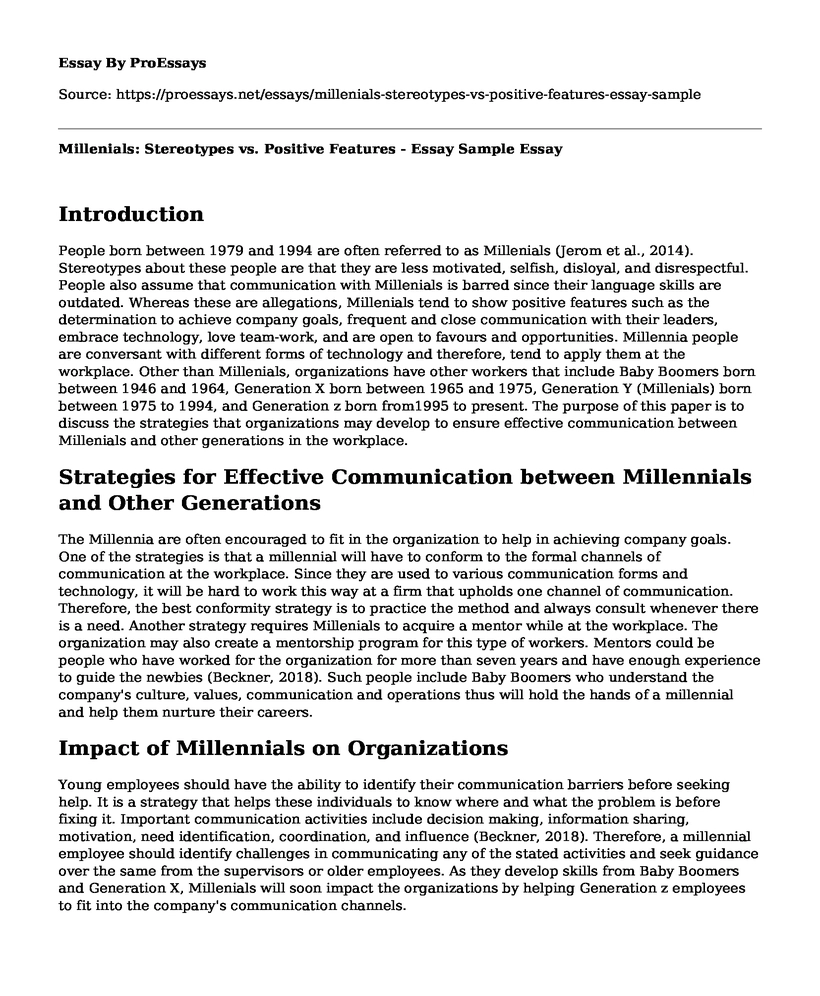Introduction
People born between 1979 and 1994 are often referred to as Millenials (Jerom et al., 2014). Stereotypes about these people are that they are less motivated, selfish, disloyal, and disrespectful. People also assume that communication with Millenials is barred since their language skills are outdated. Whereas these are allegations, Millenials tend to show positive features such as the determination to achieve company goals, frequent and close communication with their leaders, embrace technology, love team-work, and are open to favours and opportunities. Millennia people are conversant with different forms of technology and therefore, tend to apply them at the workplace. Other than Millenials, organizations have other workers that include Baby Boomers born between 1946 and 1964, Generation X born between 1965 and 1975, Generation Y (Millenials) born between 1975 to 1994, and Generation z born from1995 to present. The purpose of this paper is to discuss the strategies that organizations may develop to ensure effective communication between Millenials and other generations in the workplace.
Strategies for Effective Communication between Millennials and Other Generations
The Millennia are often encouraged to fit in the organization to help in achieving company goals. One of the strategies is that a millennial will have to conform to the formal channels of communication at the workplace. Since they are used to various communication forms and technology, it will be hard to work this way at a firm that upholds one channel of communication. Therefore, the best conformity strategy is to practice the method and always consult whenever there is a need. Another strategy requires Millenials to acquire a mentor while at the workplace. The organization may also create a mentorship program for this type of workers. Mentors could be people who have worked for the organization for more than seven years and have enough experience to guide the newbies (Beckner, 2018). Such people include Baby Boomers who understand the company's culture, values, communication and operations thus will hold the hands of a millennial and help them nurture their careers.
Impact of Millennials on Organizations
Young employees should have the ability to identify their communication barriers before seeking help. It is a strategy that helps these individuals to know where and what the problem is before fixing it. Important communication activities include decision making, information sharing, motivation, need identification, coordination, and influence (Beckner, 2018). Therefore, a millennial employee should identify challenges in communicating any of the stated activities and seek guidance over the same from the supervisors or older employees. As they develop skills from Baby Boomers and Generation X, Millenials will soon impact the organizations by helping Generation z employees to fit into the company's communication channels.
Creating a Culturally-Inclusive Workplace
Membership negotiation is a strategy that allows employees to interact at the workplace and share ideas that can impact on the business. The strategy allows newcomers to identify the areas that are suitable for them and yearn to engage more with experienced persons. As earlier mentioned. Newcomers show positive characters like the desire to learn new ideas and impact on the organization (Jerome et al., 2014). Changing trends in the economy may work to their advantage as they learn quickly and help in directing the organization towards the current business situation. As a result, organizations need to design cultures that will suit the unique abilities of the young generation and encourage the older employees to mould their evil characters into positives for the success of a firm.
Conclusion
Conclusively, an organization needs to understand the age differences of its employees and the critical challenges that they face. For instance, older employees are more experienced and communicate affluently as compared to the younger ones. On the contrary, younger employees show conformity to changing trends in technology and business diversities as compared to the older ones. Notably, Baby Boomers and Generation X employees show similar characteristics, just like Generation Y and z. Therefore, a membership negotiation strategy that brings together both young and old employees will help in working against their challenges for the common purpose of business success.
References
Beckner, K. (2018). Managing Millenial Workers: A Multigenerational Approach. Emerging Writers, 1(2018), 12. https://digitalcommons.kennesaw.edu/emergingwriters/vol1/iss2018/12/
Jerome, A., Scales, M., Whithem, C., & Quain, B. (2014). Millennials in the workforce: Gen Y workplace strategies for the next century. E-Journal of Social & Behavioural Research in Business, 5(1), 1-12. https://ugeb.pw/page_rewan.pdf
Cite this page
Millenials: Stereotypes vs. Positive Features - Essay Sample. (2023, May 22). Retrieved from https://proessays.net/essays/millenials-stereotypes-vs-positive-features-essay-sample
If you are the original author of this essay and no longer wish to have it published on the ProEssays website, please click below to request its removal:
- Racism v. Humanity Essay
- Oppression of Women in the Early 1900S to the 1950S Essay Example
- Essay Example on Advancing Equity in Austin: Working With the City's Equity Office
- Essay Sample on The Power of Communication: Verbal and Non-Verbal
- Moralistic Reasoning on Gender Issues: Leading Cause of Social Problems - Essay Sample
- Essay Sample on Two Immigrants Seeking Rights: Sukra and Abdullah's Migration Story
- Essay Sample on Ethical Dilemmas in Workplaces: Striking a Balance







